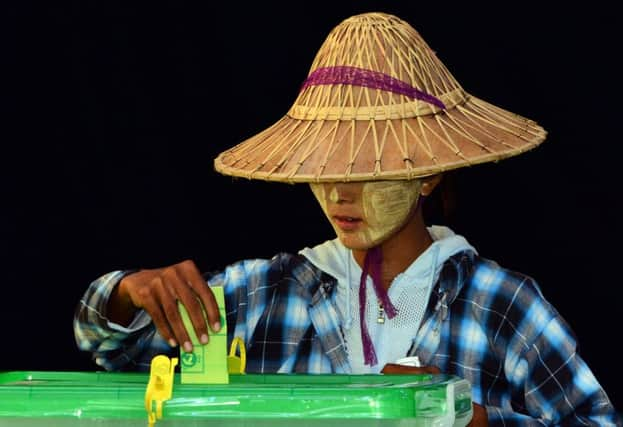Myanmar optimistic election may loosen military grip


As voting opened at 6am, lines began to form outside polling stations set up in Buddhist temples, schools and government buildings.
“I’ve am so excited to come to vote. I couldn’t sleep the whole night, so I came here early,” said Ohnmar, a 38 year-old woman who goes by one name. She was in a line at a polling centre in Yangon, where Suu Kyi also voted. “My whole family is excited. This is going to be my first experience,” she said.
Advertisement
Hide AdAdvertisement
Hide Ad“I came to vote because I want change in my country. I think Aung San Suu Kyi will win if this is a real free and fair election.”
More than 90 parties are contesting the election, but the main fight is between the National League for Democracy (NLD), led by Nobel Peace laureate Suu Kyi, and the ruling Union Solidarity Development Party, made up largely of former junta members. A host of other parties from ethnic minorities, who form 40 per cent of the country’s 52 million people, are also running.
Some 30 million people are eligible to vote.
The election is seen as Myanmar’s best chance in decades to move toward greater democracy if Suu Kyi’s party secures the highest number of seats in the bicameral Parliament and gets the mandate to govern.
But the NLD starts with a handicap: of the 664 seats in Parliament, 25 per cent are reserved for the military. This means in theory that the USDP, with the military’s support, need not win an outright majority to control the legislature. To counter that scenario, the NLD would require a huge win.
That may not be farfetched, given Suu Kyi’s popularity.
Winning the election would only be the first step toward full power for Suu Kyi’s party. After the polls, the newly elected members and the military appointees will propose three candidates, and elect one as the president. The other two will become vice presidents.
That vote will not be held before February.
Suu Kyi cannot run for president because of a constitutional amendment that bars anyone with a foreign spouse or child from holding the top job. Suu Kyi’s late husband and sons are British.
Also, the military is guaranteed key ministerial posts – defence, interior and border security. It is not under the government’s control.